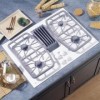GE JGP989 Owners Manual - Page 10
Using your cooktop., Using the downdraft vent system. - stainless steel
 |
View all GE JGP989 manuals
Add to My Manuals
Save this manual to your list of manuals |
Page 10 highlights
Consumer Support Troubleshooting Tips Care and Cleaning Operating Instructions Safety Instructions Using your cooktop. Use a flat-bottomed wok. Wok This Way We recommend that you use a flat-bottomed wok, available at your local retail store. Only a flat-bottomed wok should be used. Do not use a flat-bottomed wok with a wok holder. Do not use a flat-bottomed wok on a support ring. Placing the ring over the burner or grate may cause the burner to work improperly, resulting in carbon monoxide levels above allowable current standards. This could be dangerous to your health. Cookware Aluminum: Medium-weight cookware is recommended because it heats quickly and evenly. Most foods brown evenly in an aluminum skillet. Use saucepans with tight fitting lids when cooking with minimum amounts of water. Enamelware: Under some conditions, the enamel of some cookware may melt. Follow cookware manufacturer's recommendations for cooking methods. Glass: There are two types of glass cookware: those for oven use only and those for cooktop cooking (saucepans, coffee and tea pots). Glass conducts heat very slowly. Cast Iron: If heated slowly, most skillets will give satisfactory results. Heatproof Glass-Ceramic: Can be used for either surface or oven cooking. It conducts heat very slowly and cools very slowly. Check cookware manufacturer's directions to be sure it can be used on a gas cooktop. Stainless Steel: This metal alone has poor heating properties and is usually combined with copper, aluminum or other metals for improved heat distribution. Combination metal skillets usually work satisfactorily if they are used with medium heat as the manufacturer recommends. Stove Top Grills Do not use stove top grills on your sealed gas burners. If you use the stove top grill on the sealed gas burner it will cause incomplete combustion and can result in exposure to carbon monoxide levels above allowable current standards. This can be hazardous to your health. Using the downdraft vent system. OFF HI LO 10 MED How to Operate the Downdraft Vent System The built-in vent system helps remove cooking vapors, odors and smoke from foods prepared on the cooktop. Turn the vent fan speed control knob to HI, MED or LO, as needed. Continuous use of the vent system while cooking helps keep the kitchen comfortable and less humid, reducing cooking odors and soiling moisture that normally creates a frequent need for cleaning. The appearance of the burner flames may be affected when the vent fan is operating. At high fan speed setting, the flame may be drawn toward the vent opening, affecting cooking performance. IN CASE OF A POWER FAILURE, THE VENTILATION SYSTEM WILL NOT OPERATE.















